By Dave Workman | Senior Editor
Take seven attorneys, give them 70 minutes to focus on court cases involving the Second Amendment and you’ve got an educational experience that keeps a Gun Rights Policy Conference audience glued to their chairs.
Since the 2008 Heller and 2010 McDonald rulings by the U.S. Supreme Court, the Second Amendment Foundation has kept federal and some state courts busy with challenges to state and local gun control laws. The result has been that SAF and a select number of attorneys have accounted for an estimated 80 percent of all the gun-related rulings over the past few years, paving the way for even more victories.
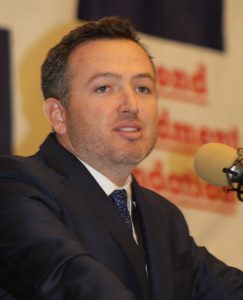
John Dillon
California attorney John Dillon said Golden State gun owners have been hurt by the myriad laws in that state, and none of those laws, which he called a “legal minefield,” have reduced gun-related crime. He ran through the list of legal speed bumps facing anyone wishing to exercise their right to keep and bear arms.
“Criminals still get their guns illegally, regardless what law California puts in place,” he stated. “In California, the law-abiding gun owner is the one who is negatively affected by these laws.”
Dillon lamented almost apologetically that California is “the birthplace for many of these absurd laws.”
He is currently involved in challenges of two of the state’s restrictive gun laws. One of those challenges a law prohibiting young adults from purchasing firearms. That case, Jones v. Becerra, challenges the law on constitutional grounds.
He is also involved in Miller v. Becerra, challenging the state’s ban on so-called “assault weapons” with another attorney on the panel, George Lee.
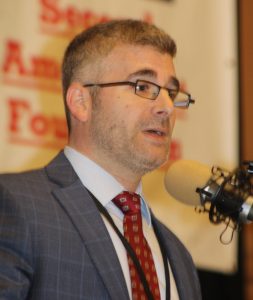
Matthew Goldstein
Dillon was followed by Matthew Goldstein, the attorney handing the Defense Distributed 3-D printing case. This one challenges the prohibition placed on Defense Distributed that prevents the firm from publishing information about three dimensional printing of firearm components under the International Trafficking in Arms Regulations (ITAR). It is a case that has been dragging along for some five years, and it argues that Defense Distributed’s First Amendment rights are being violated due to prior restraint.
Government attorneys have insisted that the company cannot publish the online codes. The ITAR is implemented by the State Department.
This is a prior restraint on public speech, Goldstein maintained, contending, “The Department of State knows, or it should know, that it cannot exercise prior restraint on public speech.”
At issue are Defense Distributed’s CAD (for Computer Assisted Design) files appearing online. This happened about the same time as the Sandy Hook tragedy, giving the Obama administration the impetus to launch a gun control campaign. The company was ordered to take down the information and it complied. But after two years of waiting, Defense Distributed and the Second Amendment Foundation filed a lawsuit. After months of litigation, the court ordered parties in the lawsuit to reach a settlement. The agreement was to amend the ITAR that would have allowed posting of the CAD files under license.
But within a few days, attorneys in New Jersey, Pennsylvania and Washington state filed actions to stop it. Goldstein called their arguments wrong. The case is continuing and parties have filed cross motions for summary judgment.
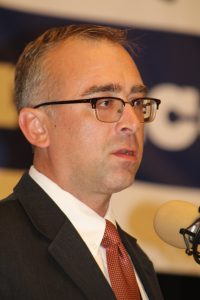
David Jensen
New York-based attorney David Jensen next spoke about the cases in which he has been involved. He is counsel on two petitions for review by the Supreme Court. He is also involved in a case in Illinois.
Jensen suggested that it is not likely to move the legal ball very far downfield, but there is some hope that a case scheduled for review by the high court, challenging a New York City gun control law that prevented handgun owners from taking their handguns outside the city.
Unfortunately, some courts have apparently been sitting on some of the cases, perhaps waiting for the high court to take some action on the New York case. The court is scheduled to have a conference on this case Oct. 1, he said.
There are four applications for review involving four different cases on Second Amendment grounds.
San Francisco attorney George Lee got a laugh when he told the audience that he had flown to the conference the day before and “the good news is that San Francisco apparently has not enacted a terrorist no-fly list yet.” This was a direct slap at the adoption of a resolution by the San Francisco Board of Supervisors that the National Rifle Association is a “terrorist organization.”

George Lee
He represents several organizations in various state and federal litigation. One of those cases challenges the California ban on “large capacity” magazines. That case is pending due to a similar challenge before the courts by the California Rifle & Pistol Association.
One problem is that there are two different versions of the large capacity magazine ban and both are live statutes.
Lee also discussed the Miller v. Becerra case, in which the goal is very simple: restore the command of Heller, which said states cannot ban firearms in common use. This means AR15-type rifles are protected.
Another case challenges California’s refusal to restore Second Amendment rights of two men whose convictions were vacated in other states. Their rights to own firearms are still being withheld.
He said the outcome of this case is important because it equates rights with special privileges that can be withheld by governments.
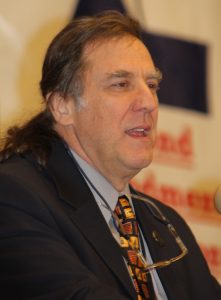
Don Kilmer
California attorney Don Kilmer provided a rundown on the situation in California from his perspective. He said there are some victories in the state, including victories over a gun show prohibitions at facilities in San Diego County and Alameda.
One of those cases had lingered for 13 years, which is now being settled.
However, the California legislature and anti-gun Gov. Gavin Newsom want to pass a state law banning gun shows on public property.
Another case challenges a gun seizures by the City of San Jose in which a woman whose firearms were grabbed when her husband ran into legal trouble. While the woman has been cleared to own firearms, the city refuses to return the seized guns.
A case is also pending that challenges the state’s handgun roster, and Kilmer said is important to win these cases because the state is gradually eroding gun rights and this must be stopped.
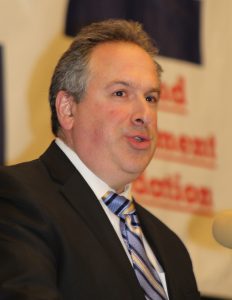
Dan Schmutter
The next attorney to take the microphone was Dan Schmutter, who briefed the audience about cases in New York and New Jersey. He said the New York City gravity knife lawsuit that has involved the arrests of thousands of people for having ordinary pocket knives that were mis-portrayed as “gravity knives.” The effort involved eight years of litigation.
Anti-gun Gov. Andrew Cuomo recently inked legislation that solved the problem, Schmutter explained. Cuomo had vetoed the legislation twice before.
Wrapping things up was Illinois attorney David Sigale, who has represented SAF in several legal actions including at least three that challenge public housing authorities that ban firearms possession by tenants, and cases that challenge prohibitions on firearms possession by foster parents.
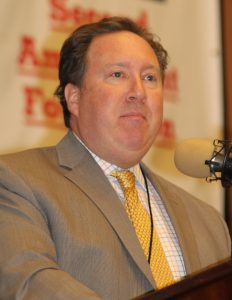
David Sigale
These cases can set important precedents that may influence how government handles this issue in the future.
He also reported the victory over the Deerfield, Illinois ban on so-called “assault weapons?” There is going to be some kind of appeal but Sigale appears ready to take on that challenge.



